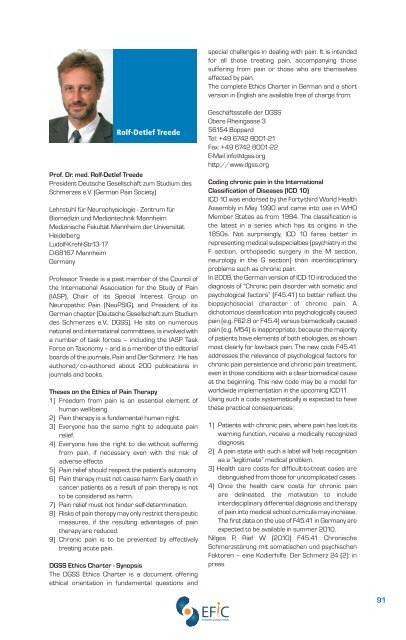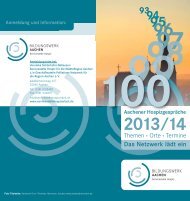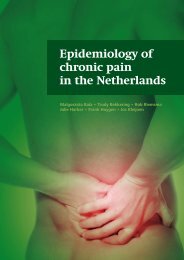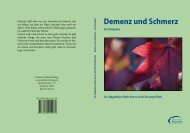First EFIC® Symposium Societal Impact of Pain - SIP
First EFIC® Symposium Societal Impact of Pain - SIP
First EFIC® Symposium Societal Impact of Pain - SIP
You also want an ePaper? Increase the reach of your titles
YUMPU automatically turns print PDFs into web optimized ePapers that Google loves.
Rolf-Detlef Treede<br />
Pr<strong>of</strong>. Dr. med. Rolf-Detlef Treede<br />
President Deutsche Gesellschaft zum Studium des<br />
Schmerzes e.V. (German <strong>Pain</strong> Society)<br />
Lehrstuhl für Neurophysiologie - Zentrum für<br />
Biomedizin und Medizintechnik Mannheim<br />
Medizinische Fakultät Mannheim der Universität<br />
Heidelberg<br />
Ludolf-Krehl-Str.13-17<br />
D-68167 Mannheim<br />
Germany<br />
Pr<strong>of</strong>essor Treede is a past member <strong>of</strong> the Council <strong>of</strong><br />
the International Association for the Study <strong>of</strong> <strong>Pain</strong><br />
(IASP), Chair <strong>of</strong> its Special Interest Group on<br />
Neuropathic <strong>Pain</strong> (NeuPSIG), and President <strong>of</strong> its<br />
German chapter (Deutsche Gesellschaft zum Studium<br />
des Schmerzes e.V., DGSS). He sits on numerous<br />
national and international committees, is involved with<br />
a number <strong>of</strong> task forces – including the IASP Task<br />
Force on Taxonomy – and is a member <strong>of</strong> the editorial<br />
boards <strong>of</strong> the journals, <strong>Pain</strong> and Der Schmerz. He has<br />
authored/co-authored about 200 publications in<br />
journals and books.<br />
Theses on the Ethics <strong>of</strong> <strong>Pain</strong> Therapy<br />
1) Freedom from pain is an essential element <strong>of</strong><br />
human well-being.<br />
2) <strong>Pain</strong> therapy is a fundamental human right.<br />
3) Everyone has the same right to adequate pain<br />
relief.<br />
4) Everyone has the right to die without suffering<br />
from pain, if necessary even with the risk <strong>of</strong><br />
adverse effects<br />
5) <strong>Pain</strong> relief should respect the patient's autonomy<br />
6) <strong>Pain</strong> therapy must not cause harm. Early death in<br />
cancer patients as a result <strong>of</strong> pain therapy is not<br />
to be considered as harm.<br />
7) <strong>Pain</strong> relief must not hinder self-determination.<br />
8) Risks <strong>of</strong> pain therapy may only restrict thera-peutic<br />
measures, if the resulting advantages <strong>of</strong> pain<br />
therapy are reduced.<br />
9) Chronic pain is to be prevented by effectively<br />
treating acute pain.<br />
DGSS Ethics Charter - Synopsis<br />
The DGSS Ethics Charter is a document <strong>of</strong>fering<br />
ethical orientation in fundamental questions and<br />
special challenges in dealing with pain. It is intended<br />
for all those treating pain, accompanying those<br />
suffering from pain or those who are themselves<br />
affected by pain.<br />
The complete Ethics Charter in German and a short<br />
version in English are available free <strong>of</strong> charge from:<br />
Geschäftsstelle der DGSS<br />
Obere Rheingasse 3<br />
56154 Boppard<br />
Tel: +49 6742 8001-21<br />
Fax: +49 6742 8001-22<br />
E-Mail info@dgss.org<br />
http://www.dgss.org<br />
Coding chronic pain in the International<br />
Classification <strong>of</strong> Diseases (ICD 10)<br />
ICD 10 was endorsed by the Forty-third World Health<br />
Assembly in May 1990 and came into use in WHO<br />
Member States as from 1994. The classification is<br />
the latest in a series which has its origins in the<br />
1850s. Not surprisingly, ICD 10 fares better in<br />
representing medical subspecialties (psychiatry in the<br />
F section, orthopaedic surgery in the M section,<br />
neurology in the G section) than interdisciplinary<br />
problems such as chronic pain.<br />
In 2009, the German version <strong>of</strong> ICD-10 introduced the<br />
diagnosis <strong>of</strong> “Chronic pain disorder with somatic and<br />
psychological factors” (F45.41) to better reflect the<br />
biopsychosocial character <strong>of</strong> chronic pain. A<br />
dichotomous classification into psychologically caused<br />
pain (e.g. F62.8 or F45.4) versus biomedically caused<br />
pain (e.g. M54) is inappropriate, because the majority<br />
<strong>of</strong> patients have elements <strong>of</strong> both etiologies, as shown<br />
most clearly for low-back pain. The new code F45.41<br />
addresses the relevance <strong>of</strong> psychological factors for<br />
chronic pain persistence and chronic pain treatment,<br />
even in those conditions with a clear biomedical cause<br />
at the beginning. This new code may be a model for<br />
worldwide implementation in the upcoming ICD11.<br />
Using such a code systematically is expected to have<br />
these practical consequences:<br />
1) Patients with chronic pain, where pain has lost its<br />
warning function, receive a medically recognized<br />
diagnosis.<br />
2) A pain state with such a label will help recognition<br />
as a “legitimate” medical problem.<br />
3) Health care costs for difficult-to-treat cases are<br />
distinguished from those for uncomplicated cases.<br />
4) Once the health care costs for chronic pain<br />
are delineated, the motivation to include<br />
interdisciplinary differential diagnosis and therapy<br />
<strong>of</strong> pain into medical school curricula may increase.<br />
The first data on the use <strong>of</strong> F45.41 in Germany are<br />
expected to be available in summer 2010.<br />
Nilges P, Rief W (2010) F45.41 Chronische<br />
Schmerzstörung mit somatischen und psychischen<br />
Faktoren – eine Kodierhilfe. Der Schmerz 24 (2): in<br />
press<br />
91






